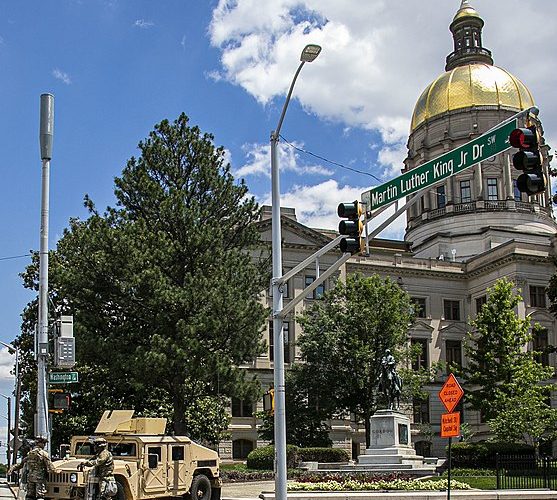Image by Georgia National Guard
Below is the executive summary of the report…
The November 3, 2020 General Election (the “Election”) was chaotic and any reported results must be viewed as untrustworthy. The Subcommittee took evidence from witnesses and received affidavits sworn under oath. The Subcommittee heard evidence that proper protocols were not used to ensure chain of custody of the ballots throughout the Election, after the opening of ballots prior to the Election, and during the recounts. The Subcommittee heard testimony that it was possible or even likely that large numbers of fraudulent ballots were introduced into the pool of ballots that were counted as voted; there is no way of tracing the ballots after they have been separated from the point of origin. The Subcommittee heard testimony of pristine ballots whose origin looked suspicious or which could not be verified and the inability of poll workers to distinguish between test ballots and absentee ballots. Signatures were not consistently verified according to law in the absentee balloting process.
Poll watchers on Election Night testified that they had noted that ballots were not secured, that seals and security tags were not used, and the chain of custody was often lax or non-existent. During the recount process, the monitors observed similar patterns of unsecured ballots that had broken seals and open cases of ballots laying around for hours or overnight in unsecured locations. There was a lack of enforcement of the law, sloppy handling of the ballots by those counting, deliberate covering-up of voting numbers by workers, lack of following the process during the recount, unsafe handling of military ballots, and insecure data such as on laptops and flash drives. According to submitted testimony, there were also many equipment failures when ballots would not go through the machines and other times when ballots were counted more than once.
A great deal of testimony supported evidence of a coordinated effort to prevent a transparent process of observing the counting of ballots during the absentee ballot opening period and on Election Night. Witnesses testified to hostility to Republican poll workers during the recount – directional signage was unavailable, doors were locked, and Republican poll watchers were sent home early or given menial assignments.
Monitors throughout the state were often kept at an unreasonably long distance – some social distancing was understandable, but monitors were blocked from having the visual ability to see what was written on the ballots or to have any meaningful way to check the counting or to double-check that what was counted was actually assigned to the right candidate. They also could not observe what was entered into the ARLO system, nor could they be told the count that was being entered into ARLO. Instead, they were told that those numbers would be totaled and come back from the Secretary of State’s Office. They were also told not to take pictures, film, or have other means of acquiring proof of the process that they were experiencing based on a rule from the State Elections Board. That rule contravenes the spirit and purpose of the election law.
The Secretary of State’s Office was unresponsive to its hotline. It has been unresponsive to many who wonder if their vote ever really counted. The office has turned a blind eye to fraud to the point that it ought to be considered gross negligence.
The Subcommittee did not have time to investigate the numerous publicly reported issues with the Dominion voting machines. The Subcommittee takes notice of the various publicly reported functions of the machines and heard evidence that the machines can duplicate fraudulent ballots to the point that not even trained personnel can tell the difference between a test ballot and a real ballot. Testimony also suggested that the system responds wirelessly to being reset from an unknown location as happened with the poll books. The Subcommittee also heard that Dominion machines can be programmed with algorithms that reallocate votes between candidates. In addition, the Dominion machines are programmed to count votes using percentages of whole numbers rather than actual votes, which is a feature incompatible with the actual voting process. The Subcommittee learned that the history and control of the company that owns the Dominion voting system is unclear and provides serious implications of foreign interference in the U.S. election.


















